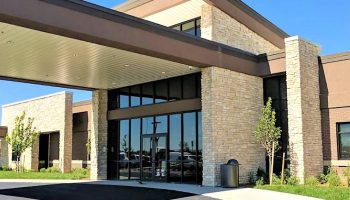Crossroads Turning Points Circle Program
About Crossroads Turning Points Circle Program
Crossroads Turning Points in Pueblo, Colorado provides CARF accredited addiction treatment and mental health services to adults aged 18 and older. Medicaid is accepted, along with other state financed health plans. Medicare is also a valid option, as well as military plans like TRICARE, self pay, and various private health plans.
The Circle Program for Residential Rehab
The Circle Program exists within this organization as a state funded, community based residential drug rehab and mental health program. The focus of the program is on stabilizing clients using 24/7 inpatient support, which can include detox services where needed.
Outpatient Continuing Care for the Whole Family
Following inpatient detox and stabilization, clients are engaged in outpatient support including therapy and life skills training to encourage a journey of ongoing healing, with continued management of substance abuse and any concurrent mental health disorders.
I think this program can be a good fit for families seeking a blend of social support and primary medical care, with this initiative specializing in recovery oriented services to get individuals back on track.
Pueblo as a Backdrop for Your Recovery
On the same campus, you’ll find the Colorado Mental Health Institute at Pueblo Museum. This museum showcases a wealth of historical significance regarding the region’s local mental healthcare, including exhibitions and artifacts that reflect how treatment has evolved over the years.
The facility is also based near several green spaces. The Pueblo Riverwalk provides scenic views overlooking the water, with walking paths and opportunities for boat rides and community events.
Meanwhile, Lake Pueblo State Park is an ideal spot for various outdoor activities. Picnics, fishing, and hikes are all possible here, and can be integrated as additional and complementary elements of recovery to promote mindful movement and physical wellbeing.
| Levels of Care | Detox Service Setting | Programs | Payment Options | ||
|---|---|---|---|---|---|
|
Inpatient and residential programs provide round-the-clock medical and emotional support as you live at the treatment facility. This level of care may be recommended if you have severe addictions or mental health conditions since it removes outside distractions and allows you to focus solely on therapy. |
Dual diagnosis programs address substance use disorders and co-occurring mental health conditions simultaneously. This integrated approach to care improves the likelihood of long term recovery and stability by addressing the root causes of addiction. |
||||
|
Inpatient detox occurs in a dedicated treatment facility. You’ll live there around the clock and receive intensive medical support and supervision to help manage your withdrawal symptoms. It is suitable for individuals with moderate to severe addictions as it ensures a stable detox environment. |
|||||
|
Adult programs address the substance use and life challenges specific to adults. Therapists can deliver sessions in individual, group and family settings. Services often include job support and life skills training in a structured environment. |
Alcohol detox programs offer medical support to help individuals withdraw safely from alcohol. Your care team may use medications to ease your symptoms and provide medical monitoring to address complications. |
Men's programs address substance use while also considering the social pressures, family roles and mental health concerns that are specific to men. You’ll learn healthy coping mechanisms as you build emotional resilience and develop communication skills. |
Opioid detox uses medications to ease severe withdrawal symptoms. It also includes medical supervision to help you manage potential complications. These services allow you to stabilize and begin a recovery plan. |
Women's programs offer a safe and supportive space to focus on gender specific issues such as trauma, family roles and mental health conditions. Therapists tailor the sessions to address women's needs and foster empowerment in a healing and nurturing environment. |
Young adult programs are designed for individuals who are transitioning into adulthood. Topics of discussion typically include identity, independence and peer relationships. Providers may also offer life skills training and career support. |
|
Payment Assistance
|
Medicaid
|
Medicare
|
Military Insurance
|
Private Insurance
|
Self Pay
|
Levels of Care
Inpatient and residential programs provide round-the-clock medical and emotional support as you live at the treatment facility. This level of care may be recommended if you have severe addictions or mental health conditions since it removes outside distractions and allows you to focus solely on therapy.
Dual diagnosis programs address substance use disorders and co-occurring mental health conditions simultaneously. This integrated approach to care improves the likelihood of long term recovery and stability by addressing the root causes of addiction.
Detox Service Setting
Inpatient detox occurs in a dedicated treatment facility. You’ll live there around the clock and receive intensive medical support and supervision to help manage your withdrawal symptoms. It is suitable for individuals with moderate to severe addictions as it ensures a stable detox environment.
Programs
Adult programs address the substance use and life challenges specific to adults. Therapists can deliver sessions in individual, group and family settings. Services often include job support and life skills training in a structured environment.
Alcohol detox programs offer medical support to help individuals withdraw safely from alcohol. Your care team may use medications to ease your symptoms and provide medical monitoring to address complications.
Men's programs address substance use while also considering the social pressures, family roles and mental health concerns that are specific to men. You’ll learn healthy coping mechanisms as you build emotional resilience and develop communication skills.
Opioid detox uses medications to ease severe withdrawal symptoms. It also includes medical supervision to help you manage potential complications. These services allow you to stabilize and begin a recovery plan.
Women's programs offer a safe and supportive space to focus on gender specific issues such as trauma, family roles and mental health conditions. Therapists tailor the sessions to address women's needs and foster empowerment in a healing and nurturing environment.
Young adult programs are designed for individuals who are transitioning into adulthood. Topics of discussion typically include identity, independence and peer relationships. Providers may also offer life skills training and career support.




